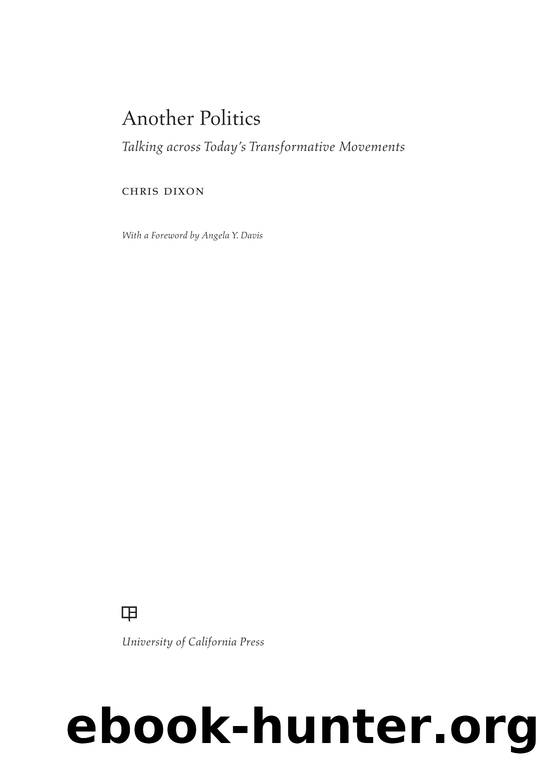Another Politics by Chris Dixon

Author:Chris Dixon
Language: eng
Format: epub, pdf
ISBN: 9780520279018
Publisher: University of California Press
THE âALL THE SAMEâ FALLACY
The second flawed conception around leadership is that weâre all the same. The central idea here is that people come into nonhierarchical groups with more or less the same skills, kinds of knowledge, and levels of confidence. Anti-authoritarians share an aspiration that everyone should be able to participate equally in making decisions and carrying out plans, and we frequently assume that the way to put this into practice is to proceed as though everyone is already pretty much capable of doing everything or will quickly figure it out. For the most part, activists and organizers correctly understand that skills, knowledge, and confidence are forms of power. But we donât have clear ways to acknowledge or appreciate these kinds of power and how they affect which leadership rolesâif anyâan individual takes on. In denying leadership, then, we frequently pretend that everyone in our projects and organizations is similar in terms of what they can do, what they know, and how they feel about their abilitiesâor at least, similar enough that we donât need to devote much energy to developing these capacities.
Sharmeen Khan, a longtime organizer and editor of Upping the Anti in Toronto, talked about this conception as âthe assumption that weâre walking into this equal.â But, she argued, this doesnât reflect whatâs actually happening. In fact, people come into movement spaces with vast differences between them. Clare Bayard, an organizer in San Francisco with the Catalyst Project, elaborated on this point: âPeople not only have different life experiences in terms of what they bring in organizing experiences and their perspectives and their understanding, but [they] also have had different amounts of mentoring, of study, of really thinking things through, of doing their own visioning or strategizing.â Rahula Janowski, another San Francisco organizer, offered the specific example of political experience: âHow can someone whoâs been in the movement for ten years and been in the organization for three years operate on the same level as someone whoâs been in the movement for two years and the organization for two months? It just is completely unrealistic.â The reality is that, as Bayard concluded, âWe all actually are bringing different things to the table.â
The notion that âweâre all the sameâ is a fallacy. In accepting and sustaining it, we confuse acknowledging differences in skills, knowledge, and confidence with justifying such differences and the power bound up in them. In some cases, anti-authoritarians see even the act of identifying differences in ability as inherently oppressive, as if naming power relations somehow creates or maintains them. In this way, the âall the sameâ fallacy feeds on our silence: when we donât talk about differences, we donât have to confront their crucial implications and the challenges they pose for our organizing. But ignoring them doesnât make them go away. On the contrary, the conception that âweâre all the sameâ creates persistent problems.
Joshua Kahn Russell, reflecting on his experiences as a founding organizer with the new SDS, talked helpfully about some of these
Download
This site does not store any files on its server. We only index and link to content provided by other sites. Please contact the content providers to delete copyright contents if any and email us, we'll remove relevant links or contents immediately.
| Anthropology | Archaeology |
| Philosophy | Politics & Government |
| Social Sciences | Sociology |
| Women's Studies |
The Secret History by Donna Tartt(19034)
The Social Justice Warrior Handbook by Lisa De Pasquale(12183)
Thirteen Reasons Why by Jay Asher(8885)
This Is How You Lose Her by Junot Diaz(6873)
Weapons of Math Destruction by Cathy O'Neil(6261)
Zero to One by Peter Thiel(5783)
Beartown by Fredrik Backman(5734)
The Myth of the Strong Leader by Archie Brown(5495)
The Fire Next Time by James Baldwin(5426)
How Democracies Die by Steven Levitsky & Daniel Ziblatt(5211)
Promise Me, Dad by Joe Biden(5141)
Stone's Rules by Roger Stone(5080)
A Higher Loyalty: Truth, Lies, and Leadership by James Comey(4947)
100 Deadly Skills by Clint Emerson(4915)
Rise and Kill First by Ronen Bergman(4776)
Secrecy World by Jake Bernstein(4739)
The David Icke Guide to the Global Conspiracy (and how to end it) by David Icke(4697)
The Farm by Tom Rob Smith(4501)
The Doomsday Machine by Daniel Ellsberg(4482)
